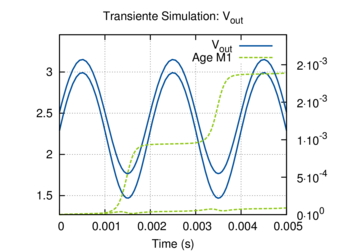Analog/Mixed-Signal-Design
-
Integrated Circuit Design for a High-voltage Class-D amplifier (SmartAmp)The overall goal of this project is to implement a high voltage (min. 60 V) and a high frequency class‑D amplifier including integrated current replication circuit and signal generator for harsh environment at temperatures up to 175 °C.Led by: Prof. Dr.-Ing. Bernhard WichtTeam:Year: 2022Funding: IndustrieDuration: 01.06.2021-31.05.2023
![]()
![]()
-
Investigation of efficient voltage converter topologies for the next generation of microcontrollersThe increasing use of driver assistance systems through to fully autonomous vehicles requires the integration of a large number of different sensors in the automobile. More and more powerful microcontrollers are required for the evaluation and further processing of the sensor data. The aim of the project is to research and develop a power management system that can be directly integrated into the microcontroller. The focus is on high energy efficiency, compactness and low costs. In addition, solutions for scalability of the system are to be developed that allow easy adaptation to different output power ranges.Led by: Prof. Dr.-Ing. Bernard WichtTeam:Year: 2021Funding: IndustrieDuration: 01.04.2020 – 31.03.2023
![]()
![]()
-
GaN-on-SiThe GaN-on-Si process technology enables a fully integrated solution for future power electronics, including high efficiency, small size and minimized parasitics. Depending on the level of GaN integration that can be achieved, additional monolithic integration markets become viable. While this offers a significant opportunity for innovation and differentiation, a minimum threshold level of integration is required before this becomes achievable. The aim of this project is to explore the options and limitations for GaN monolithic integration - to gain experience, develop best practice and provide feedback to process development.Led by: Prof. Dr.-Ing. Bernhard WichtTeam:Year: 2020Funding: IndustrieDuration: 01.10.2017 – 31.09.2020
![]()
![]()
-
Fully integrated and system-optimized electronics solutions for solar modules(Voyager-PV)For three decades, the idea of inverters integrated directly into the solar module has been pursued in science and industry. With such AC solar modules, enormous cost and quality advantages are possible. The aim of the project is to create the technological prerequisites for a drastic reduction in the cost of small-scale PV system electronics, while at the same time meeting significantly higher reliability and service life requirements in this segment and the new future requirements with regard to grid suitability, digitization and security.Led by: Prof. Dr.-Ing. Bernhard WichtTeam:Year: 2020Funding: BMWi 7. Energieforschungsprogramm „Innovationen für die Energiewende“Duration: 01.04.2020 – 31.03.2023
![]()
![]()
-
Multi-Energy Harvesting (MEH) - A Flexible Platform for Energy Harvesting in Home AutomationIn this project, a platform concept for intelligent home automation components is developed, which can serve as a basis for next-generation sensors and actors. The main characteristic of this platform concept is ultra-low power consumption and ultra-low voltage operation. In combination with harvested energy from multiple sources (multi-energy harvesting), an extended lifetime and reduced battery cell requirements become possible compared to current systems.Led by: Prof. Dr.-Ing. H. Blume, Prof. Dr.-Ing. B. Wicht, apl. Prof. Dr.-Ing. G. Payá VayáTeam:Year: 2019Funding: BMBFDuration: October 2018 - March 2021
![]()
![]()
-
Research on reconfigurable, passive microelectronic components for energy efficiency and flexibility (ERMI)This research project uses new, reconfigurable passive components for integrated energy-efficient voltage transformers for local power supply (point-of-load). The goal is increased energy efficiency and a phase-adapted circuit design. This is especially important for multi-phase converters that use a large number of parallel inductors to meet the increasing requirements for highly efficient and powerful power supplies for modern microcontrollers and processors in important growth areas such as mobility, industrial, energy and biomedicine.Led by: Prof. Dr.-Ing. Bernhard WichtTeam:Year: 2019Funding: BMBF „Forschung für neue Mikroelektronik“ (ForMikro)Duration: 01.10.2019 – 31.09.2023
![]()
![]()
-
Gate Driver with Digitally Controlled Slope ShapingInvestigation, modelling and optimization of the switching behavior of various power semiconductors (IGBT, CoolMOS, OPTIMOS, SiC FET). Concept development and circuit design for optimized gate drivers with digitally controlled slope shaping for motor drive, SMPS and PFC applications.Led by: Prof. Dr.-Ing. Bernhard WichtTeam:Year: 2018Funding: IndustryDuration: completed
![]()
![]()
-
Highly Integrated ACDC Converters for Direct 230 V Mains Supply of Integrated CircuitsResearch on circuit and system concepts for ACDC converters for direct 230V mains supply of integrated circuits (ICs) and electronics modules containing those ICs with the goal to eliminate the need for bulky external power supplies and to optimize the power efficiency dependent on load conditions.Led by: Prof. Dr.-Ing. Bernhard WichtTeam:Year: 2018Funding: Bundesministerium für Bildung und ForschungDuration: completed
![]()
![]()
-
Highly Integrated Current Sensing for High-performance Power ElectronicsDevelopment of circuit and system concepts for highly integrated current sensing with galvanic isolation for drives / motors and DCDC converters in various power classes.Led by: Prof. Dr.-Ing. Bernhard WichtTeam:Year: 2018Funding: Bundesministerium für Bildung und Forschung / Robert Bosch GmbHDuration: completed
![]()
![]()
-
Switched-Mode Power Supplies with Digital ControlThis project explores the possibilities and advantages of adaptive digital control for automotive switched-mode power supplies. The goals are better control performance with less area and lower cost, less parameter variations, improved transient response.Led by: Prof. Dr.-Ing. Bernhard WichtTeam:Year: 2018Funding: IndustrieDuration: completed
![]()
![]()
-
Fast switching DCDC convertersResearch on circuit concepts for fast switching integrated DCDC converters with the goal of system cost reduction by eleminating external componentsLed by: Prof. Dr.-Ing. Bernhard WichtTeam:Year: 2018Funding: IndustrieDuration: completed
![]()
![]()
-
Gate Drivers for High-Voltage DevicesSystem and circuit concepts for gate driver ICs to control galvanic isolated power transistors, including GaN devices. Targets are improvements in reliability, reduced cost and new functionalities.Led by: Prof. Dr.-Ing. Bernhard WichtTeam:Year: 2018Funding: Öffentlich gefördert und IndustriekooperationDuration: completed
![]()
![]()
-
High-voltage converter ICs >300 V for micro power supplies in IoT applicationsResearch on circuit and system concepts for DCDC and ACDC converters for the direct connection of an IC or electronic systems built from it to the 230V network with the motivation to save external large-volume power supplies and to set optimal power efficiency depending on the operation. In addition to IoT, applications in the fields of electromobility, industry and energy are addressed.Led by: Prof. Dr.-Ing. Bernhard WichtTeam:Year: 2017
![]()
![]()
-
Hybrid DCDC ConvertersExplore the potential of hybrid integrated DCDC converters, by combining inductive and capacitive DCDC converter schemes, study of theory and state-of-the-art, definition and implementation of an innovative converter concept.Led by: Prof. Dr.-Ing. Bernhard WichtTeam:Year: 2016Funding: Industry
![]()
![]()
Electronic Design Automation
-
KI4BoardNet: DC/DC converter for on-board networks with AI-based controlThe aim of the sub-project is to research DC-DC converters for automotive electrical systems with self-learning algorithms to compensate for fluctuations in passive L-C components. This should make it possible to use significantly more cost-effective components with larger parameter tolerances.Led by: Prof. Dr.-Ing. Bernard WichtTeam:Year: 2023Funding: BMBFDuration: 1.12.2022-30.11.2025
![]()
![]()
-
Formal Verification of Analog AI Hardware (FAI)The aim of the project is to research formal methods for the verification of analog neural networks. The focus is on the parameter variations of the analog circuit components.Led by: Dr.-Ing. Markus OlbrichTeam:Year: 2022Funding: DFGDuration: 1.7.2022-30.6.2025
![]()
![]()
-
New Simulation Methods for Accelerated Mixed-Signal SimulationThis research project is based on an approach for the automated model generation for accelerated mixed-signal simulation of analog circuit models and the associated simulation methodology for a transient analysis. Studies have shown good results, which make a significant acceleration in the simulation of mixed analog/digital-systems. Up to now, the current approach is limited to piecewise-constant input stimuli. One of the fundamental goals of this project is an extension of the novel simulation methodology that enables additional input signal types.Led by: Prof. Dr.-Ing. Erich BarkeTeam:Year: 2019Funding: Deutsche Forschungsgemeinschaft (DFG): BA 812/24-1Duration: March 2014 - February 2017
-
Formal Abstraction and Verification of Analog Circuits (faveAC)In the faveAC project, methods are being developed for the modeling and formal verification of analog circuits.Led by: Dr.-Ing. Markus OlbrichTeam:Year: 2019Funding: DFGDuration: März 2017 - Februar 2020
-
ANCONA: Analog Mixed-Level Modeling with Accelerated Mixed-Signal Simulation to Increase Analog CoverageThe IMS develops method and measures for the analysis of analog verification coverage. The goal is to evaluate and to increase the verification coverage of analog and mixed-signal circuits.Led by: Dr.-Ing. Markus OlbrichTeam:Year: 2017Funding: BMBFDuration: Juli 2014 - Juni 2017
![]()
![]()
-
RESCAR 2.0The IMS is subcontractor of the Infineon AG and will develop methods to manage domain-overlapping constraints.Led by: Prof. Dr.-Ing. Erich BarkeTeam:Year: 2014Funding: BMBFDuration: February 2011 - April 2014
![]()
![]()
-
3D-FloorplanningThe main goal of this research project is to find appropriate optimization algorithms and datastructures for 3D-Floorplanning. Furthermore, new relevant optimization goals should be identified and analysed.Team:Year: 2014Duration: completed
![]()
![]()
-
Reliable Behavioural ModellingThis project aims at generating behavioural models which include parameter variations of the original circuit. Parameter variations are represented by affine arithmetic.Led by: Prof. Dr.-Ing. Erich BarkeTeam:Year: 2014
-
Solving methods for semi-symbolic analog simulationParameters of analog circuits are not exactly known as they are influenced by fabrication, aging or environment temperature. At the Institute of Microelectronic Systems an analog circuit simulator was developed which use affine arithmetic to simulate these parameter deviations. This project aims at increasing the convergence area by using parameter splitting.Led by: Prof. Dr.-Ing. Erich BarkeTeam:Year: 2014Duration: January 2012 - May 2015
-
NEEDSHighly integrated electronic systems with heterogeneous components enable reduction of resources and cost. To further benefit from the potential of electronic systems, NEEDS has the goal to advance the research in designing a new class of electronic systems, where several dies are stacked above each other (three-dimensional integrated circuits).Led by: Dr.-Ing. Markus OlbrichTeam:Year: 2013Funding: The project NEEDS is funded by the Bundesministerium für Bildung und Forschung (BMBF).Duration: 2010 - 2013
![]()
![]()
-
ROBUSTROBUST researches new methods and procedures for designing robust nanoelectronic systems. The project defines quantitative measures of robustness. These metrics are determined by abstracting models of robustness and by applying new analysis methods suitable for the system level.Led by: Prof. Dr.-Ing. Erich BarkeTeam:Year: 2009Funding: BMBFDuration: Mai 2009 - April 2012
![]()
![]()









































